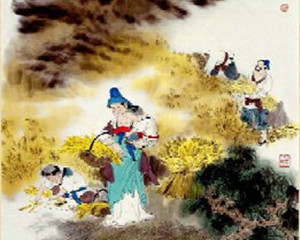《观刈麦》是唐代诗人白居易的早期作品。此诗描写了麦收时节的农忙景象,对造成人民贫困之源的繁重租税提出指责,对于诗人自己无功无德又不劳动却能丰衣足食而深感愧疚,表现了一个有良心的封建官吏的人道主义精神。在写作手法上,诗人将全景式刻画与特定人物描写相结合,夹叙夹议,使全诗成为一个有机的整体。

白居易·《观刈麦》
田家少闲月,五月人倍忙。
夜来南风起,小麦覆陇黄。
妇姑荷箪食,童稚携壶浆。
相随饷田去,丁壮在南冈。
足蒸暑土气,背灼炎天光。
力尽不知热,但惜夏日长。
复有贫妇人,抱子在其旁。
右手秉遗穗,左臂悬敝筐。
听其相顾言,闻者为悲伤。
田家输税尽,拾此充饥肠。
今我何功德,曾不事农桑。
吏禄三百石,岁晏有余粮。
念此私自愧,尽日不能忘。
Watching the Reapers
Bai Juyi
Farmers have but little leisure,
but the fifth month is the busiest;
last night there came a strong
south wind and the wheat
turned to gold in the fields;
came wives and daughters
with carrying-poles, children
with water pots, streaming
out to the fields to serve
the strong lads harvesting;
heat from the earth burned
the reapers feet; the sun played
on their backs like fire,
yet all were so busy they did
not care; they only feared that
the sun would soon set.
And then I saw coming
a poor woman carrying her child on her back,
in her right hand some ears
she had gleaned, in her left
a broken basket; and I listened
to her as she spoke:
"The crop in my home all
goes for taxes; only if I glean
can I get enough to fill
my stomach!"
I look at myself wondering
what right have I, what special
virtue, to be given three hundred
piculs of rice each year, enough
to eat with plenty to spare;
I listen and feel shame; this
I cannot forget.
(Rewi Alley 译)
更多精品翻译素材,敬请关注可可英语。











